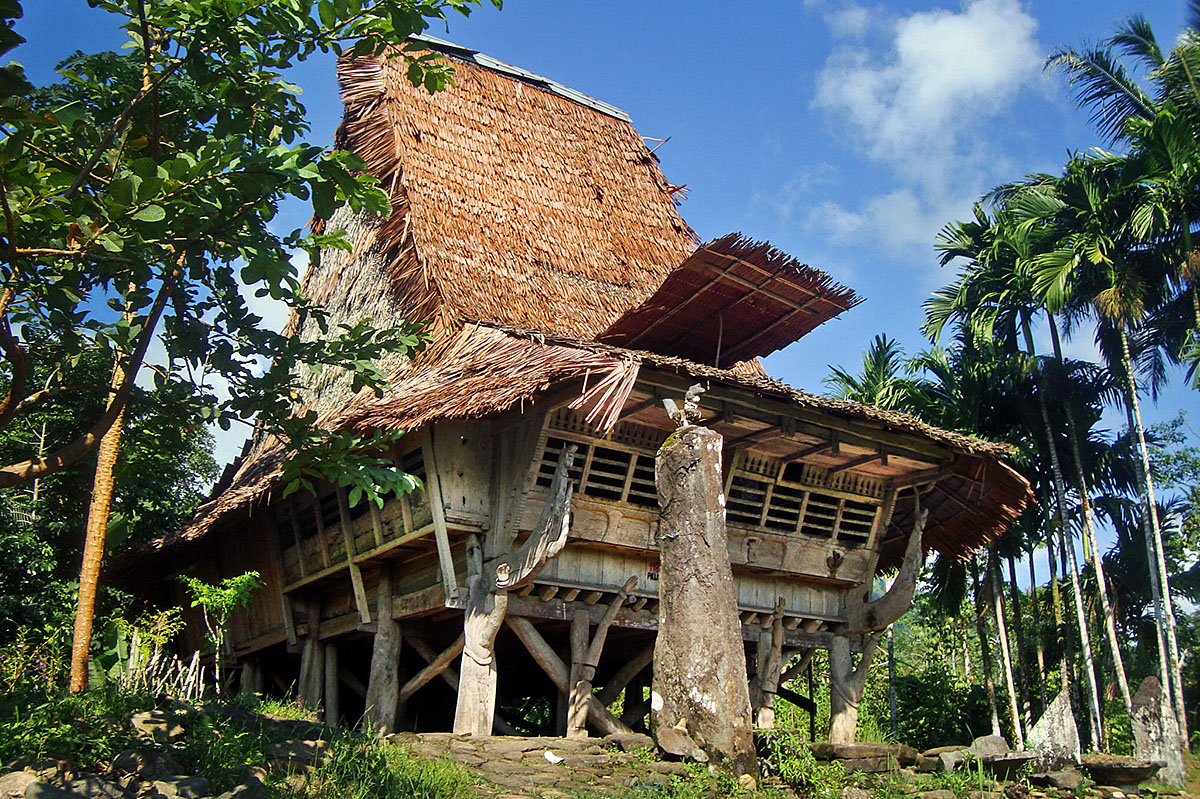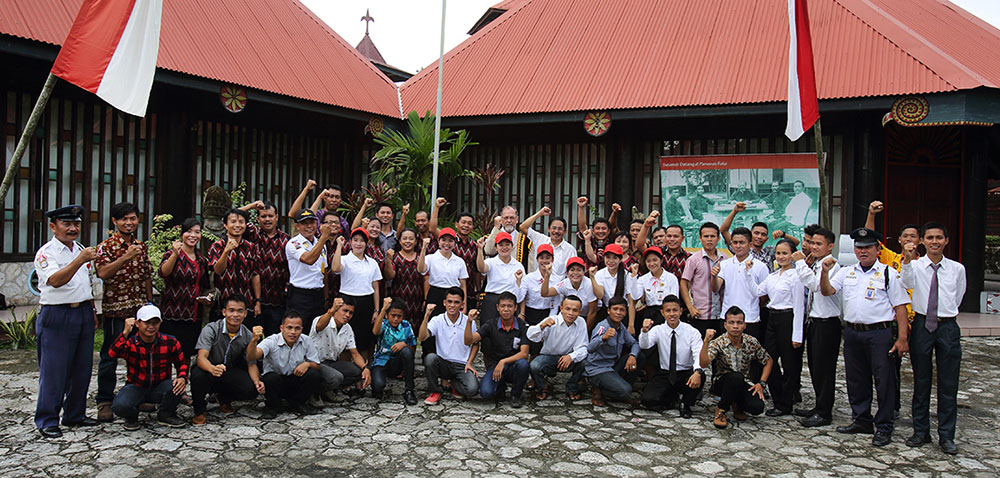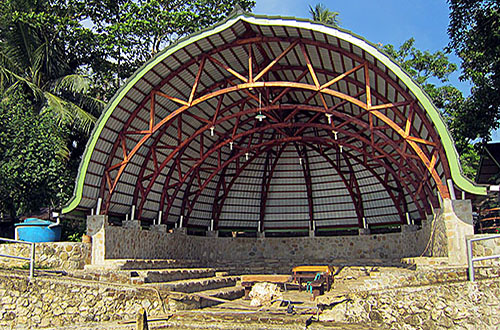Profile - Nias Heritage Foundation
The Nias Heritage Museum is managed by the Nias Heritage Foundation that is a social and non-profit organisation focusing on the preservation of Nias culture. The Nias Heritage Foundation was founded by Pastor Johannes Hämmerle who has been working on Nias Island since 1971. During his work he became very interested in the language, culture and history of Nias. He also realised that due to poverty and a lack of education this unique culture was disappearing very fast. He started collecting historical and cultural artefacts in order to preserve them for the future. The idea was to preserve these items for the community of Nias and avoid important artefacts being destroyed or removed from the island. 20 years after Pastor Johannes started collecting Nias artefacts the Nias Heritage Foundation (Yayasan Pusaka Nias-YPN) was officially inaugurated in 1991. The main mission of the foundation is to manage and operate a museum and cultural center for the preservation of both the tangible and the intangible cultural heritage of Nias.

Pastor Johannes with a group of guests at the museum exhibition rooms.
Since its inauguration, the foundation has broadened its activities to also include education, research, environmental awareness and sustainable tourism. Today the Museum complex has become one of the most important tourism attraction and recreational park on Nias, popular with both local people and visiting tourists.

A traditional house in the Gomo region. One of many houses that the Museum have helped to rehabilitate.
Apart from managing the museum complex, the foundation is involved in many outreach projects related to cultural education, environment and research. After the disastrous 2005 earthquake the Foundation brought international attention to the threatened cultural heritage of Nias. As a result the Foundation worked closely with many international organisations facilitating the rehabilitation of hundreds of traditional houses and cultural sites all over the island.
In 2014 Pastor Johannes Hämmerle was nationally recognised when he recieved the Ministry of Cultures award for “best conservationist of cultural heritage” in Indonesia for 2014.
Main activities of the Nias Heritage Foundation
The museum is used as a base for many activities related to the preservation of Nias culture:
- Collecting and exhibiting a variety of Nias cultural artefacts.
- Research and publishing books and articles about Nias culture.
- Managing a public library for students and researchers.
- Cultural training for organisations and individuals
- Visual and audio-visual documentation of Nias culture.
- Research and education about traditional medicine including maintaining a herbal garden.
- Research and conservation of local Nias flora and fauna.
- Managing a recreational park with a cultural focus open to the public.
- Assisting villages around Nias to rehabilitate traditional houses and megalithic sites.
- Revitalising the art of traditional dance and music.
- Promoting and developing Nias Island as a tourism destination, particularly for cultural tourism.

The Museum cultural dance group performing in front of the exhibition during the Museums 25th birthday celebrations.
Organisation
Museum Pusaka Nias is the longest-running, largest and most stable not-for-profit organisations on Nias. It is well known and respected throughout the community in all parts of the Island. Museum Pusaka Nias is managed by a dedicated team of loyal staff, who have spent many years working together to develop the museum to what it is today. The Museum is governed by the board of the Nias Heritage Foundation. For more details about our senior staff look on the right side of this page.

Museum management team: Director of Nias Heritage Museum Mr Nata'alui Duha (left). Vice Director Mrs Oktoberlina Telaumbanua (middle). Secretary of the Nias Heritage Foundation Mr Ottorius Harefa (right).
Additional staff is working in security, admissions, café, zoo, guesthouse, gardens and public works. In total some 40 people work at the museum. The organisation is often aided by volunteers and students, both local and foreign.
Funding
The Museum is a private non-for profit foundation and as such does not receive any funding from the government. Initially the foundation relied on a network of partner organisations and supporters to fund its programs and activities. Today the Museum generates funds from admissions, guesthouse, events and café sales. The museum strives to become increasingly self-sufficient through these activities but will continue to rely on grants and donations to fund its various programs.
Vision
Instil a love of Nias ethnic culture and encourage the community to recognize, appreciate, and develop cultural values and turn this into positive and constructive character building of the people of Nias.
Mission
Develop and manage a museum called "Museum Pusaka Nias" ( Nias Heritage Museum) as the base and embodiment of this vision .
Assist the community to maintain and develop the cultural knowledge, wisdom and values existing on Nias today, making it an educational resource for the development of both individuals and community.
Research, document, exhibit and publish both tangible and intangible expressions of Nias culture as a source of knowledge and reflection.
Promote awareness amongst the community about the higher values contained in Nias culture.

Nias Heritage Museum staff photo from 2016.
MUSEUM FACILITIES

EXHIBITION ROOMS; showcasing the highlights of the Nias Heritage Museums collection of Nias artefacts.

MUSEUM CAFÉ; serves drinks, snacks and a selection of tasty meals.

MINI ZOO; our small educational Zoo with mammals, birds and reptiles native to Nias Island.

MUSEUM LODGES; our guest accommodation, including four traditional Nias houses.

MEETING ROOMS: four types of event rooms suitable for meetings, training and celebrations.

LIBRARY; our collection of over 700 titles related to Nias.
MUSEUM MANAGEMENT AND STAFF

Pastor Johannes M. Hämmerle OFMCap. Founder of the Nias Heritage Foundation

Pastor Dionisius Laia, OFMCap. Chairman of the Nias Heritage Foundation

Pastor Pius Ndruru, OFMCap. Chairman of the Board of Trustees of the Nias Heritage Foundation
Pastor Martinus Halowo Fau, OFMCap. Secretary of the Nias Heritage Foundation
Bruder Medard Sihura, OFMCap. Treasurer of Nias Heritage Foundation
Nata'alui Duha. Director of the Nias Heritage Museum. In charge of all aspects of managing the Museum
Oktoberlina Telaumbanua. Head of Business at Nias Heritage Museum
Faozisökhi La'ia. Head of Collection and Exhibition Management.
Fabius Ndruru. Administration and Publications
Idaman Harefa. Finance and Accounting
Hatima Farasi. Treasurer
Arozanolo Gulö. Head of Library, and Animal Park
Gratiano Telaumbanua. Network & Engineering, Design, Website.
Faozatulö Gulö. Transportation, Logistics and General Services
Filemon Hulu. Guide, Social Media Publication
MUSEUM LOGO
The Museum logo is an iconic symbol in Nias culture. It is called Ni'ogololimo and is a representation of the inside of a fruit. There are different segments, but the outer skin holds it together, just like the people and culture of Nias.


